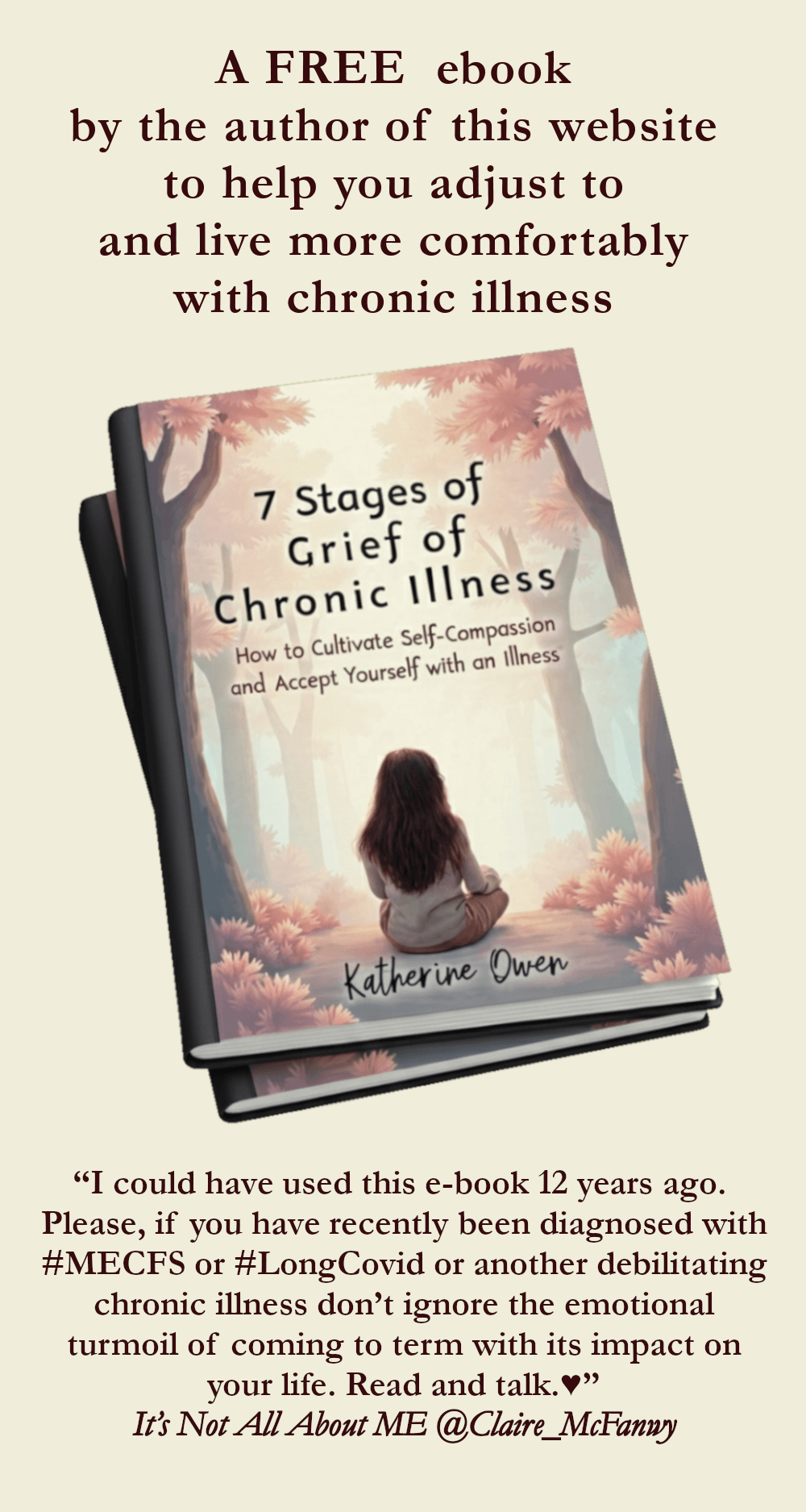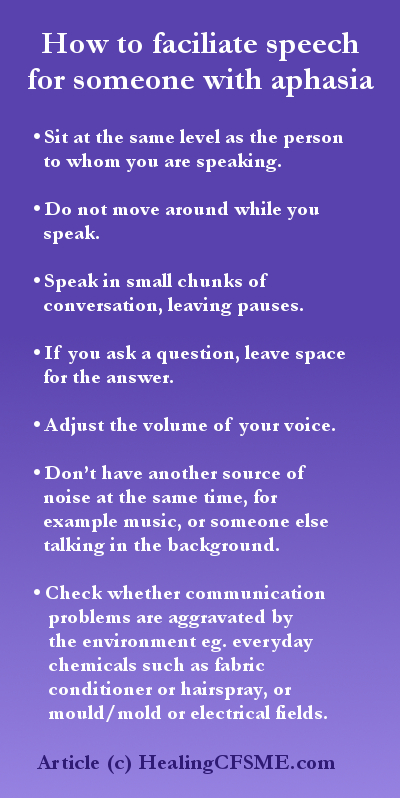and move towards health
ME/CFS Speech Issues including
Brain Fog - How to help
Do you know someone with ME/CFS with speech issues which affect their ability to take in words?
Do they have brain fog issues which restrict their ability to socialise with you or ask you for help?
Are you a friend or family member who is asking one of the following:
- How can I have social time with the person with ME/CFS (Myalgic Encephalomyelitis/Chronic Fatigue Syndrome and reduce the cost they pay in heightened symptoms from PEM (post exertional malaise)?
- How can I act in a way which means this person with ME/CFS can overcome speech issues and ask for some of the help they need?
Or click here to CHOOSE FROM
A RANGE OF personalizable cards and gifts.
The healing-themed gifts are designed by myself, Katherine, the author of
this website HealingCFSME.com
Proceeds go towards the cost of the website. Thank you. Enjoy!
Or perhaps you feel rejected by a friend with ME/CFS because they have said no to a visit.
If
you suspect the person's physical symptoms are limiting their ability
to socialise, how about sending them a link to this article?
Ask them to let you know if they have speech problems.
Ask if any of the advice is relevant and let them know you are willing to do your best to adapt as needed.
Even
if they don't have problems with speech, the kindness of your inquiry
may help them find the courage to tell you some action you could take or reassurance you could give that would be helpful for them.
Speech
issues such as a problem with taking in words are symptoms which are
more heightened in those with severe ME/CFS (Myalgic
Encephalomyelitis/Chronic Fatigue Syndrome).
However, if you are
sharing a house with a friend or family member with this chronic illness
at a mild or moderate level, you will be spending time with them when
they are most exhausted. At such times the CFS symptoms are likely to be aggravated.
Anything you can do to adapt to the
cognitive demands of ME/CFS will go a long way towards helping the
person to function at their best.
This advice will also be helpful for a health professional wanting to communicate in the most helpful way with a client with ME/CFS.
How to help a friend or loved one with speech issues such as taking in your words
I used to live with very severe ME/CFS. The approaches listed below are those which helped me to be able to take in someone's words.
If you have a
friend with ME/CFS with speech issues, try them to see if they help.
I relate to the speech issues experienced by someone who has just had a stroke. These speech problems have the medical name of aphasia.
But please know that different people with this chronic illness have different symptoms.
You may need
to follow different advice in order to help your friend or family member to communicate.
In my case, for 14 years I could only speak safely when enabled to do so by the following behaviours:
- Sit at the same level as the person to whom you are
speaking.
It was far harder to talk if someone was above me. It was painful to raise my eyes to look at someone.
(When I was in hospital in a raised bed I discovered that it was even easier to communicate if someone was not only at the same level but below my line of sight.) - Stay still while
you speak.
Any noise or movement interfered with my ability to comprehend what someone was saying and could lead to aggravation of the headache and a greater sense of confusion. -
Speak in small chunks of conversation, leaving pauses.
If you ask a question, leave space for the answer.
A carer would ask a question. I took a little while to take in the words. Probably less than a second but it felt long to them. Then I would try and push out the words to reply which also took a little time.
By then a carer would often repeat the question.
My brain switched from trying to reply to coping with and understanding this new noise coming at me.
I would feel so frustrated when I decoded it - I am trying to explain how it felt! - only to find it was the same question.
If someone spoke when I was trying to push out a reply it also aggravated the head pain which would then make it harder still to reply! -
Adjust the volume of
your voice.
If the person with ME/CFS is sensitive to noise, be careful not to speak to loudly.
I had many carers who were used to dealing with elderly deaf clients. They came in with their voice booming. They were being kind, but it knocked my ability to be able to say a few words to ask them for what I needed.
Sadly, if someone spoke very quietly, I also found it hard. I found whispering irritating to my nervous system.
I also needed and still need the volume to be louder than the tinnitus I experience.
Ho hum.
It was hard for someone to get it right and hard for me to be safe with someone. -
Whenever possible, don’t have another source
of noise at the same time.
It felt as though the brain equipment for being able to prioritise one noise over another was faulty. The quieter the environment the more able I was to speak.
Avoid talking over music or when another person is talking.
Avoid interrupting when you can. - Check whether the problem understanding speech is aggravated by the
chemical environment.
If the person has loss of speech or cognitive difficulties in reaction to perfume, deodorant etc, do what you can not to use these products when you visit them. Use unperfumed products when possible.
I almost left out this point. On reflection, it was one of the biggest issue for me. Certain products affected my brain so badly that I could not open and close my mouth to be fed, let alone speak!
For someone else with ME/CFS, Multiple Chemical Sensitivity (MCS) may not be an issue at all.
For others, the presence of mould may aggravate their speech issues.
For others, it will be light sensitivity or movement.
For others, it will be sensitivity to movement. - Help the person to relax
The harder I tried to speak, the more I got blocked in bringing out the words. (The same was true when my body got locked in a position and I tried hard to move.)
The fastest way out of this for me was to relax and pretend to myself and my body that I didn't care whether it spoke or moved!
You can help your friend or family member with severe ME/CFS to do the equivalent.
Let your friend know that you are not feeling pressured for a response. You can communicate this with your body language - for example by sitting down and looking like you are not in a rush for an answer.
You might say a few words like "Take your time". Make sure it's only a few words!
For some people with Chronic Fatigue Syndrome-ME or any chronic illness, the shock of illness may have pushed their central nervous system into overdrive. Symptoms of generalised anxiety disorder (GAD) may result.
The symptoms of GAD can lead to or aggravate any speech issues.
A non stressful relaxing environment calms the nervous system and may help to overcome communication problems. - Reassure the person with problems speaking that you are willing to adapt
Give the person reassurance that it's OK to tell you what helps them with being able to understand your words.
It may be obvious to you that you want to help, but they may have met many people along the way who take offence at being asked to adjust their way of talking. Your reassurance will mean a lot. - When possible, ask a question with a yes or no answer. Not both.
This tip is for those who live with more severe ME/CFS and have severe speech issues such that they can't speak much at all.
For example, when you ask "Do you want the door shut?" the person who can't speak much can reply yes or no.
If instead you ask, "Do you want the door open or shut?" it becomes a more difficult question to process, it becomes a question that can not be answered in one word. - Support the person with ME/CFS in pacing out activity
Chronic Fatigue Syndrome and Myalgic Encephalomyelitis are chronic illnesses which have no cure at this time. Often the best health management approach is to pace out activity by alternating periods of rest and activity. This applies not only to physical activity but also to cognitive activity.
Periods of time which the person with ME/CFS spends understanding words or speaking need to be alternated with quiet times.
Maybe talk for a while, take a break and then come back for another period of time together. For some the safe talking period will be 5 minutes or under. For some it will be an hour or more. - Find a way to be together without talking or without talking as much.
One friend used to visit occasionally and meditate with me.
It was joyous to have company, and yet not experience the limitations and discomfort that came with the speech issues I had. - Express appreciation of the efforts the person with Myalgic Encephalomyelitis makes to communicate.
If someone with severe ME/CFS asks how you are, and you know that the words are an effort and that listening to the reply is an effort, every now and again tell them that you appreciate the work involved.
They may have to choose very carefully where they assign their energy and efforts.
They are choosing to spend their energy on you because they value you.
You may be doing something else today, but they may spend several days (or longer) recovering. - IN ADDITION:
You can let the person know that you are willing to communicate in other ways.
* Are you willing to read what they have written?
* Do you have an answer machine they can talk to? For me, the speech issues were connected with cognitive overload. I could talk as long as it was a one-way conversation.
* Can you buy them a notetaker so they can leave message for you. You could take the notetaker outside the room, listen to the message, and come back into respond?
Stanford University professor Ron Davis has a son with severe ME.
For an understanding of how profound sensory and speech issues can be when living with severe ME/CFS, click through to read about the adaptations he and his wife make to ensure they can spend a little time, "a holy moment" with their son Whitney.
Two different parts of the brain
In the list above of how to help someone with speech issues and taking in words,
you will see the advice not to talk too much in a row and to leave
pauses. These pauses give the person with aphasia or dysphasia the space
to take in and understand what you have said.
In a normal working brain a person can speak and
comprehend simultaneously.
For me, between a question or an amount of speech, I
needed a pause to absorb what had been said.
I then needed another pause to formulate the words for an answer.
Since my relative recovery, I have learned that there are indeed two different parts of the brain – one part responsible for comprehension and another part responsible for speech.
Feel ok about making mistakes with communication with someone with ME/CFS
Don't expect yourself to help someone with ME/CFS to communicate perfectly the first time or ever!
Although it would be wonderful to do that, it may not be possible and is not so important.
It
is far more important to persevere in learning skills to help someone to talk and help them with understanding words in a way that doesn't aggravate their cognitive symptoms.
Your perseverance will communicate
to the person
with ME/CFS that they are worth your effort.
This in turn will help to
motivate them to continue to overcome the physical difficulties of
illness in order to communicate socially with you and/or communicate to
ask for the help they need.
Be very patient with yourself when you make mistakes in helping someone
with speech issues.
Remember that everyone else is probably making mistakes
with them too.
If everyone gives up on them, they will be left isolated and without company or help. You are doing the best you can.
Thank you for helping someone with Myalgic Encephalomyelitis/Chronic Fatigue Syndrome
This ME/CFS website aims to help with healing within and beyond illness. When you help a family member or friend to communicate regardless of their speech issues, you are potentially doing both.
Communication allows the person with ME/CFS to have a bigger life even with the illness.
A restful head and the ability to ask for what they need increases their chances of having a life which gives them sufficient rest to have a chance to heal.
In addition, your compassion, friendship, love and support may well bring them emotional healing.
If you are the family member or friend of someone with severe Chronic Fatigue Syndrome, thank you so much for all you are doing.
Other relevant articles on this healing website
- What is Chronic Fatigue Syndrome-ME?
- More about my personal experience of living bedbound with severe Chronic Fatigue Syndrome.
I have written a number of articles on speech issues experienced by someone with ME/CFS. They are all likely to be relevant to helping someone with understanding words. Click on that link for the full list.
Receive daily inspiration...
by putting your favorite (favourite) healing quote on
a mug, cushion, postcard, coaster, T shirt etc.
You will find my zazzle gift store at
zazzle.com/HealingStore.
Use one of my designs or start from a blank.
Thank you from me, Katherine, author of HealingCFSME.com
 |
© Katherine T Owen. All articles on this website are copyrighted. I am delighted if you choose to click above to share this page on social media, but please
do not copy, print or otherwise use without my permission. Thank you. Disclaimer:
I am not a medical practitioner. The articles on this website are not
to be taken as medical advice. Please consult a medical practitioner as
necessary. |








